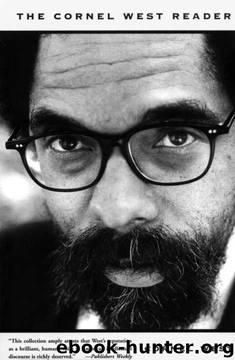The Cornel West Reader by Cornel West

Author:Cornel West [West, Cornel]
Language: eng
Format: epub
Published: 2009-08-20T05:35:00+00:00
A WORLD OF IDEAS
This interview was my first television appearance in America. Of course, Bill Moyers is a master interviewer. He teased out features of my style and substance often overlooked by others. He and I have precious roots in Texas, are shaped by Baptist church experiences and are deeply concerned about race and injustice in America. This was an ideal place for me to express my beliefs to a television audience for the f rst time. My audience base rose quickly after this interview.
Bill Moyers: You've been seen in some very unusual places for an intellectual: the storefronts and streets of Harlem, the shanty-towns of South Africa, one of the worst high schools in one of the worst districts in Brooklyn. Why? Those are so far from Princeton, so far from the ivory tower.
Cornel West: I understand the vocation of the intellectual as trying to turn easy answers into critical questions and putting those critical questions to people with power. The quest for truth, the quest for the good, the quest for the beautiful all require us to let suffering speak, let victims be visible and let social misery be put on the agenda of those with power. So to me, pursuing the life of the mind is inextricably linked with the struggle of those who have been dehumanized on the margins of society.
Moyers: One black intellectual said you make him uncomfortable with your ease out there on the street.
West: Certainly I have tried, on the one hand, to uphold the discipline of the life of the mind, but, on the other hand, to keep track of other people's humanity, their predicaments and plights. I want to empathize and sympathize with them the best that I possibly can.
Moyers: Many Americans believe that a substantial portion of the black community in the inner cities is simply saying yes now to death, violence and hate. What do you find when you go there?
West: I do find a lot of meaninglessness and hopelessness, but at the same time I find people who are struggling, trying to survive and thrive under excruciating conditions. So the question becomes: How does one attempt to transform this meaninglessness and hopelessness into a more effective kind of struggle and resistance? It's a very difficult task, but there are many highly courageous people, working people, ordinary people, who are trying to hold on to meaning and value in a society that revolves more and more around the market mentality, the market ethos that permeates almost every sphere of this society.
Moyers: What does that ethos do to a community?
West: It makes it very difficult to hold on to nonmarket values, such as commitment in relationships, solidarity, community, care, sacrifice, risk and struggle. Market values encourage a preoccupation with the now, with the immediate.
Moyers: The future is now.
West: That's exactly right. What that means, then, is people feel they no longer have to work or sacrifice. Why? Because the big money can be achieved right now. In the black community market activity is at its most pernicious and vicious right now in the drug industry.
Download
This site does not store any files on its server. We only index and link to content provided by other sites. Please contact the content providers to delete copyright contents if any and email us, we'll remove relevant links or contents immediately.
| African-American Studies | Asian American Studies |
| Disabled | Ethnic Studies |
| Hispanic American Studies | LGBT |
| Minority Studies | Native American Studies |
Cecilia; Or, Memoirs of an Heiress — Volume 1 by Fanny Burney(32558)
The Great Music City by Andrea Baker(32020)
Cecilia; Or, Memoirs of an Heiress — Volume 2 by Fanny Burney(31956)
Cecilia; Or, Memoirs of an Heiress — Volume 3 by Fanny Burney(31942)
We're Going to Need More Wine by Gabrielle Union(19047)
All the Missing Girls by Megan Miranda(16031)
Pimp by Iceberg Slim(14508)
For the Love of Europe by Rick Steves(14124)
Bombshells: Glamour Girls of a Lifetime by Sullivan Steve(14077)
Talking to Strangers by Malcolm Gladwell(13371)
Norse Mythology by Gaiman Neil(13370)
Fifty Shades Freed by E L James(13243)
Mindhunter: Inside the FBI's Elite Serial Crime Unit by John E. Douglas & Mark Olshaker(9344)
Crazy Rich Asians by Kevin Kwan(9293)
The Lost Art of Listening by Michael P. Nichols(7506)
Enlightenment Now: The Case for Reason, Science, Humanism, and Progress by Steven Pinker(7314)
The Four Agreements by Don Miguel Ruiz(6765)
Bad Blood by John Carreyrou(6622)
Weapons of Math Destruction by Cathy O'Neil(6281)
